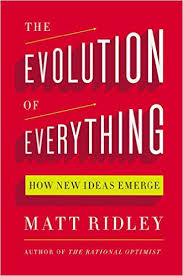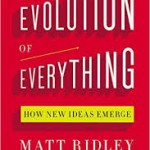Excerpted from The Evolution of Everything: How New Ideas Emerge by Matt Ridley. With permission of the publisher, HarperCollins Publishers 
The Evolution of the Economy
Depending on whose estimate you choose, and how you correct for inflation, the average person alive in the world today earns in a year between ten and twenty times as much money, in real terms, as the average person earned in 1800. Or rather, he or she can afford ten or twenty times as many goods or services. Call it, as the economic historian Deirdre McCloskey does, the ‘great enrichment’. She says it is the ‘main fact or finding of economic history’. Indeed, says McCloskey, depending on how you allow for improvements in things like steel girders, plate glass and medicine, the standard of living could have risen as much as a hundred times just since 1950 in a place like Hong Kong. At the rate the world economy is growing – and it has shown no signs of deceleration – the average human being may be earning up to sixteen times as much again in 2100 as he or she does today, according to the OECD: that’s $175,000 a year in today’s money. The Great Recession of 2008–09 was just a brief blip in global terms: one year when the global economy shrank by less than 1 per cent before growing by 5 per cent the next.
By far the lion’s share of this improvement went (and still goes) to ordinary workers and the poor. As McCloskey puts it, although the rich got richer, ‘millions more have gas heating, cars, small pox vaccinations, indoor plumbing, cheap travel, rights for women, lower child mortality, adequate nutrition, taller bodies, doubled life expectancy, schooling for their kids, newspapers, a vote, a shot at university and respect. Global inequality is currently falling fast as people in poor countries get richer quicker than people in rich countries. The proportion of the world population living on $1.25 a day, corrected for inflation, has gone from 65 per cent in 1960 to 21 per cent today.
Surprising as it may seem, the cause of the great enrichment is still unknown. That is to say, there are plenty of theories about why incomes started growing so rapidly in some parts of the world in the early nineteenth century, and this then spread to the rest of the world, and – despite repeated predictions that it would stop – they just keep on growing today. But none of these theories commands universal allegiance. Some credit institutions, others ideas, others individuals, others the harnessing of energy, yet others luck. They all agree on two things, however: no body planned this, and nobody expected it. Prosperity emerged despite, not because of, human policy. It developed inexorably out of the inter action of people by a form of selective progress very similar to evolution. Above all, it was a decentralized phenomenon, achieved by millions of individual decisions, mostly in spite of the actions of rulers. Indeed, it is possible to argue, as Daron Acemoglu and James Robinson do, that countries like Britain and the United States grew rich precisely because their citizens over threw the elites who monopolized power. It was the wider distribution of political rights that made government accountable and responsive to citizens, allowing the great mass of people to take advantage of economic opportunities.
Human action, but not human design
The great enrichment was an evolutionary phenomenon. Let’s return to the late eighteenth century, when Britain stands on the brink of this great enrichment, and revisit that great thinker about the general theory of evolution, Adam Smith. In 1776 Smith published his second book, The Wealth of Nations. In it he set out to champion a different evolutionary idea from that which he had set out in his Theory of Moral Sentiments. If God was not the cause of morality, was government the cause of prosperity? In Smith’s day, commerce was a tightly regulated business, with joint-stock companies chartered specifically and exclusively by the state to have monopolies, and mercantilist trade policies designed to promote certain kinds of foreign exports, not to mention professions strictly licensed by the government. In the cracks between the paving stones of regulation and dirigisme individuals could buy and sell, but pretty well nobody thought this was the source of prosperity. Wealth meant accumulating precious things.
The ‘physiocrats’ in France had at least begun to suggest that productive work was the source of wealth, not heaps of gold. From François Quesnay, leader of the physiocrats, whom he met in 1766, Smith picked up the idea that mercantilist direction of trade was a mistake, as was government grabbing all the revenue of trade to spend on ruinous wars and futile luxuries: their cry was ‘Laissez faire et laissez passer, le monde va de lui même!’ (Let do and let pass, the world goes on by itself!). But the physiocrats insisted, strangely, that the only kind of productive work was farming. Manufacture and services were wasteful frittering. Smith said instead that the ‘annual produce of the land and labour of the society’ was what counted. Today we call that GDP.
So becoming more prosperous means the same as becoming more productive – growing more wheat, making more tools, serving more customers. And the ‘greatest improvement in the productive power of labour’, Smith argued, ‘seems to have been the effects of the division of labour’. If the farmer supplies food to the iron monger in exchange for tools, then both are more productive, because the first does not have to stop work and make a tool badly, while the latter does not have to stop work to till a field badly. Specialization, accompanied by exchange, is the source of economic prosperity.
Here, in my own words, is what a modern version of Smithism claims. First, the spontaneous and voluntary exchange of goods and services leads to a division of labour in which people specialize in what they are good at doing. Second, this in turn leads to gains from trade for each party to a transaction, because everybody is doing what he is most productive at and has the chance to learn, practice and even mechanize his chosen task. Individuals can thus use and improve their own tacit and local knowledge in a way that no expert or ruler could. Third, gains from trade encourage more specialization, which encourages more trade, in a virtuous circle. The greater the specialization among producers, the greater is the diversification of consumption: in moving away from self-sufficiency people get to produce fewer things, but to consume more. Fourth, specialization inevitably incentivizes innovation, which is also a collaborative process driven by the ex change and combination of ideas. Indeed, most innovation comes about through the recombination of existing ideas for how to make or organize things.
The more people trade and the more they divide labour, the more they are working for each other. The more they work for each other, the higher their living standards. The consequence of the division of labour is an immense web of cooperation among strangers: it turns potential enemies into honorary friends. A woollen coat, worn by a day labourer, was (said Smith) ‘the produce of a great multitude of workmen. The shepherd, the sorter of the wool, the wool-comber or carder, the dyer, the scribbler, the spinner, the weaver, the fuller, the dresser…’ In parting with money to buy a coat, the labourer was not reducing his wealth. Gains from trade are mutual; if they were not, people would not voluntarily engage in trade. The more open and free the market, the less opportunity there is for exploitation and predation, because the easier it is for consumers to boycott the predators and for competitors to whittle away their excess profits. In its ideal form, therefore, the free market is a device for creating networks of collaboration among people to raise each other’s living standards, a device for coordinating production and a device for communicating information about needs through the price mechanism. Also a device for encouraging innovation. It is the very opposite of the rampant and selfish individualism that so many church men and others seem to think it is. The market is a system of mass cooperation. You compete with rival producers, sure, but you cooperate with your customers, your suppliers and your colleagues. Commerce both needs and breeds trust.
Imperfect markets are better than no markets
Few would disagree with this formulation, but equally few would accept that the ideal is ever realised in practice. And that, churchmen aside, is where all the disagreement about markets comes from. Fine in theory, useless in practice – so goes the verdict of most right-thinking people on the topic of markets.
The question then becomes whether commerce only works if it is perfect. Are semi-free markets better than none? The economist William Easterly is in no doubt that the invisible hand is not Utopia: ‘It is the process of driving out of business the incompetent in favour of the mediocre, the mediocre in favour of the good, and the good in favour of the excellent.’ A glance at economic history makes clear that countries run by and in the interests of merchants have not been perfect, but they have always been more prosperous, peaceful and cultured than countries run by despots. Phoenicia versus Egypt; Athens versus Sparta; the Song of shop keepers (England) versus Napoleon; modern California versus modern Iran; Hong Kong versus North Korea; Germany in the 1880s versus Germany in the 1930s.
There is no longer much doubt that free commerce has a better economic or humanitarian record than command-and control government. The examples just keep rolling in. Take the history of Sweden, for instance. Contrary to conventional wisdom, Sweden did not become wealthy as a result of having a big government imposing social democracy. When it liberalized a feudal economy and strongly embraced Smithian free trade and free markets in the 1860s, the result was rapid growth and the spawning of great enterprises over the next fifty years, new products). When it expanded government hugely in the 1970s, the result was currency devaluation, stag nation and slow growth, culminating in a full-blown economic crisis in 1992 and a rapid fall in the country’s relative standing in the world’s economic league table. When it cut taxes, privatised education and liberalised private healthcare in the 2000s, it rediscovered growth.
To argue that free commerce leads to more prosperity than government planning is not, of course, to argue that all government should be abolished. There is a vital role for government to play in keeping the peace, enforcing the rules and helping those who need help. But that is not the same as saying government should plan and direct economic activity. Likewise, for all its virtues, commerce is not perfect. It has a habit of encouraging wasteful and damaging extravagances, not least because it leads to the marketing of signals for conspicuous consumption.
The central feature of commerce, and the thing that distinguishes it from socialist planning, is that it is decentralised. No central direction is required to tell the economy how many woollen coats, laptops or cups of coffee are needed. Indeed, when somebody does try to do so, the result is a miserable mess. Or North Korea. Prices, if allowed free to rise or fall, will gravitate under competition towards the cost of production, as demand matches supply. Suppliers will direct their efforts to the products most valued at any one time, driving down price and satisfying the most intense demand. The system is run by the decisions of millions of individuals.
Get Evonomics in your inbox
In this way, prosperity, when it grows at all, grows entirely organically, without any direction from above. The division of labour has emerged, uninvited, within society. It has evolved. It is stimulated by our natural willingness to trade. And ‘the propensity to truck, barter, and exchange one thing for another’, in Smith’s famous phrase, comes naturally to human beings, but not to other animals: ‘Nobody ever saw a dog make fair and deliberate exchange of a bone with another dog.’ So it is this propensity, if encouraged, that will cause prosperity to increase. Government’s role is to let it happen, not to direct it.
The central problem for systems of command and control, whether fascist, communist or socialist, is the knowledge problem. As champions of free enterprise from Frédéric Bastiat to Friedrich Hayek have pointed out, the knowledge required to organise human society is bafflingly voluminous. It cannot be held in a single human head. Yet human society is organised, none the less. As Bastiat put it in his 1850 Economic Harmonies, how would one even contemplate setting out to feed Paris, a city with hordes of people with myriad tastes? It is impossible. Yet it happens, without fail, every day (and Paris has a still vaster population today, with more eclectic taste in food). There is a close parallel with evolution here. The feeding of Paris and the working of the human eye are equally complex manifestations of order. But in neither case is there a central commanding intelligence. The knowledge is dispersed among millions of people/ genes. It is decentralised. As so often, Smith got there first, saying in The Wealth of Nations: ‘The sovereign is completely discharged from a duty, in the attempting to perform which he must always be exposed to innumerable delusions, and for the proper performance of which no human wisdom or knowledge could ever be sufficient; the duty of superintending the industry of private people, and of directing it towards the employments most suitable to the interest of the society.
Invisible hands
This decentralised emergence of order and complexity is the essence of the evolutionary idea that Adam Smith crystallised in 1776. In his famous metaphor, Smith made the guiding hand invisible: each person ‘intends only his own security; and by directing that industry in such a manner as its produce may be of the greatest value, he intends only his own gain, and he is in this, as in many other cases, led by an invisible hand to promote an end which was no part of his intention’. Yet when Smith wrote his Wealth of Nations, there was little good evidence for his central idea that free exchange of goods and services would produce general prosperity. Up until the late eighteenth century much wealth creation had been by plunder in one form or another, and there was nothing remotely resembling a freemarket government in power anywhere in the world.
Yet in the decades that followed the book’s publication, Britain in particular (and then much of Europe and North America) played out an extraordinary story of rising living standards, falling inequality and declining violence – thanks largely to the partial and hesitant following of Smith’s recipe. Sceptics might argue that the accumulation of plundered capital from the empire was the source of that wealth, but this is plainly nonsense. As Smith so clearly saw, colonies were mostly a drain and a military distraction. Nor can capital explain the sheer scale of what happened to living standards. As Deirdre McCloskey puts it, in the great enrichment of the past two hundred years average income in Britain went from about $3 a day to about $100 a day in real terms. That simply cannot be achieved by capital accumulation, which is why she (and I) refuse to use the misleading, Marxist word ‘capitalism’ for the free market. They are fundamentally different things.
Adam Smith is no paragon. He got plenty wrong, including his clumsy labour theory of value, and he missed David Ricardo’s insight about comparative advantage, which explains why even a country (or person) that is worse than its trading partner at making everything will still be asked to supply something, the thing it or he is least bad at making. But the core insight that he had, that most of what we see in society is (in Adam Ferguson’s words) the result of human action but not of human design, remains true to this day – and under-appreciated. This is true of language, of morality and of the economy. The Smithian economy is a process of exchange and specialisation among ordinary people. It is an emergent phenomenon.
Excerpted from The Evolution of Everything: How New Ideas Emerge by Matt Ridley. With permission of the publisher, HarperCollins Publishers
Donating = Changing Economics. And Changing the World.
Evonomics is free, it’s a labor of love, and it's an expense. We spend hundreds of hours and lots of dollars each month creating, curating, and promoting content that drives the next evolution of economics. If you're like us — if you think there’s a key leverage point here for making the world a better place — please consider donating. We’ll use your donation to deliver even more game-changing content, and to spread the word about that content to influential thinkers far and wide.
MONTHLY DONATION
$3 / month
$7 / month
$10 / month
$25 / month
You can also become a one-time patron with a single donation in any amount.
If you liked this article, you'll also like these other Evonomics articles...
BE INVOLVED
We welcome you to take part in the next evolution of economics. Sign up now to be kept in the loop!
























